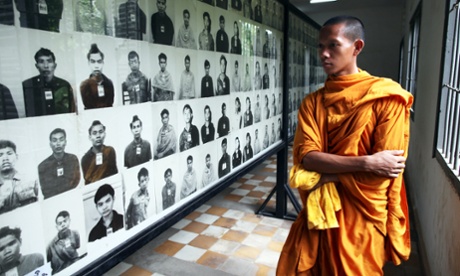The Abbott government is said to be taking steps to export its refugee problem to one of the region's poorest country, Cambodia. I've seen first hand why this is a terrible idea

In a nationwide poll published in January, 60% of Australians said they wanted boat arrivals treated more harshly. It now appears they're getting their way. After sending hundreds of asylum-seekers to Papua New Guinea (PNG), the second poorest country in southeast Asia, the Abbott government is said to be taking steps to export its refugee problem to Cambodia, another one of the region's poorest country and one of the most anarchical: a police state with a law and order deficit that could exceed even that of PNG.
Going back a decade, I spent two years working as a reporter in Cambodia. On any given day, I would write about crimes and injustices perpetrated upon women, children, disabled people, the homeless and refugees. The perpetrators were alarmingly often the monied elite working in cahoots with police, the military or politicians – the very people and agencies tasked to protect the public.
One morning, I was dragged out of bed by a neighbour whose village had been flattened by bulldozers during the night after a well connected businessman laid claim to their land. When I arrived on the scene, the villagers were camped on the roadside with the crushed and twisted remains of their meagre belongings. Those who protested were met with brute force in the form of electric cattle prods that left deep blue bruises across their arms and backs.
On another occasion, I was called to the office of renowned anti-trafficking activist Somaly Mam. A few hours earlier, armed men raided her women's shelter and abducted 83 women and girls who only a few days earlier had been rescued from a city brothel by anti-trafficking police. It was later revealed that the armed raid was ordered and paid for by the brothel's owner, a general in the army, who then put his sex slaves straight back to work.
In both these cases, nobody was ever charged. Those are everyday examples of Cambodia's unique culture of impunity that harks back to the Khmer Rouge genocide of the 1970s, when 1.7m people were beaten, starved, or worked to death. Despite a lengthy tribunal sponsored by the international community, only one Khmer Rouge henchman has beensuccessfully prosecuted in Cambodia.
If another reason was needed to show Cambodia's unsuitability as a dumping ground for asylum-seekers, one need look no further than those who made the mistake of arriving on their own accord. Cambodia has a long and storied history of extraditing refugees on request of the authoritarian regimes they fled from – most infamously in 2009 when 20 Uygur minorities, including a pregnant woman and children, were deported to China while their cases were being reviewed by the UN commission for human rights. On return to China, 17 of the 20 were detained and sentenced in closed courtroom trials.
Refugees in Cambodia are also susceptible to being further victimised by a deeply ingrained sense of xenophobia borne from more than five centuries of war with neighbouring states. Siem Reap, home of the famous Angkor Wat archeological park, translates literally as the "defeat of Siam'" – the historical name of Thailand. In 2003, rumours that a Thai television star said Angkor Wat belonged to Thailand sparked a wave of riots that saw the Thai embassy in Phnom Penh and dozens of Thai-owned businesses and restaurants burnt to the ground.
Many Cambodians also bear special animosity towards the country's largest ethnic minority, the Vietnamese, whose allegiances are assumed to lie east of the border. Stories attesting to Vietnamese duplicity passed down between generations and fuelled by stories in the tabloid press regularly manifest in random acts of violence on the streets of Cambodia. Most recently, an ethnic Vietnamese man was lynched by a mob following a minor traffic infraction inFebruary, while police looked on in broad daylight.
It is in this total vacuum of opportunity, human rights, law and order that Hor Namhong – the Cambodian foreign minister who ignored a summons to appear before the Khmer Rouge tribunal after he was accused by a witness of running of a re-education camp – is considering an Australian request to grant refuge to some of our asylum-seekers. “In the past, Cambodians have fled their country to other countries,” he said after a meeting with Australian counterpart Julia Bishop earlier this year, “but now it's time that Cambodia takes in refugees from other countries.”
I am going to go out on a limb here and suggest he was motivated by something other than compassion. Australia is set to give $85m in aid to Cambodia this year – significantly less than the $527m given to PNG yearly – but reason enough for the recipient to kowtow to donor's demands, no matter how ridiculous they may seem.
I can think of few things more terrifying than being set adrift without money, marketable skills or contacts in Cambodia. Should Australia succeed in its mission to deport asylum-seekers there, it will become yet another in a long line of immoral and illegal acts of parliament future generations of Australians will have to say sorry for.


No comments:
Post a Comment